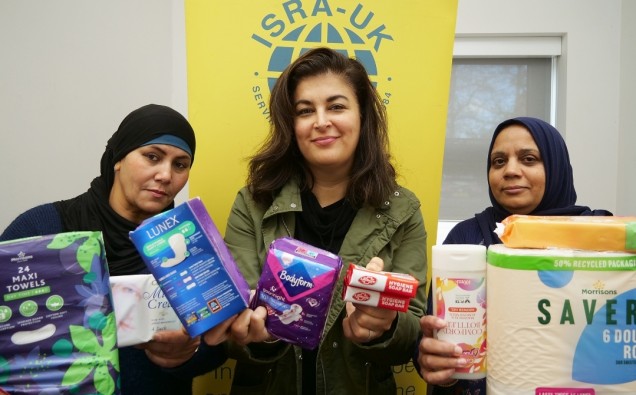A group of women from Birmingham are set to deliver a truckload of hygiene and sanitary items to women in Gaza, who have such a shortage of period pads that they’re resorting to using scraps of tent fabric.
The emergency convoy mission is a response to women in Gaza being forced to use bits of tent material and scrap paper in place of period products, as the Israeli bombardment of the occupied territory continues.
Displaced women living in Rafah are so desperate, they are cutting out small pieces of the tents they rely on for shelter from the cold and rain to use as a substitute for period pads, which increases the risk of infection.
Many women in the besieged region have also said they go weeks without showering amid dire humanitarian conditions.
With more than a million displaced people currently sheltering in Rafah, the city has been overwhelmed with more than four times its usual population as Palestinian’s fleeing war seek refuge in extremely overcrowded conditions.
Launching fundraising on International Women’s Day (Friday 8 March), West Midlands humanitarian charity ISRA-UK is preparing to send an all-female deployment to Egypt to prepare and pack a 40ft container with emergency hygiene packs for women and children in Gaza.
Travelling during Ramadan, the British women’s group will be packing boxes of period pads, panty liners, wipes and mother and baby hygiene items and toiletries onto pallets in Egypt; before the aid is transported directly to Gaza through the Rafah border, authorised by the Palestine Ministry of Social Affairs.
“We are on a mission to get hygiene products to the women and girls of Gaza, as requested by our Palestinian partners on the ground there,” said Saraya Hussain, who will be leading the deployment team.
“The situation there is dire and desperate and the women need us. They’ve requested our help and we need people to donate, help us fundraise for sanitary items and join our deployment group if they can commit to this endeavour.”
Almost everyone currently trapped in Gaza is starving, with little access to clean drinking water, sanitation or electric power.
“Lacking clean water, women and girls on their periods are unable to wash themselves and stay clean. Many women are being forced to use period products or substitutes for longer than is safe. This and the inability to clean themselves is putting the women in Gaza at risk of developing infections and becoming increasingly unwell,” added Saraya.
“Sanitary pads are so scarce in Gaza right now that one girl sheltering in an UNWRA school in the Maghazi camp had to resort to washing used pads with soap, causing her serious skin irritation, but she had no other choice.”
Six months into Israel’s assault on Gaza, the majority of people trapped in the territory are in dire need of basic resources to survive; and for women, the war has brought an additional monthly dread.
The UN estimates that nearly 700,000 women and girls in Gaza have menstrual cycles, which they are struggling to manage with limited or no access to sanitary items.
UNRWA has reported that there is only one toilet per 486 people at its shelters in Rafah, with a serious lack of privacy for women.
Only one of the three water pipelines from Israel to Gaza is currently functioning, according to UNOCHA – United Nations Office for the Coordination of Humanitarian Affairs.
People are only accessing an average of 1.5 to 2 litres of water per day – which is below the 3 litres needed for their basic survival, and well below the minimum 15 litres required per person each day to cover all water and sanitation-related needs, including washing.
ISRA-UK has been officially authorised to deliver vital aid directly into Gaza by the State of Palestine’s Ministry of Social Affairs, by way of its Rafah District emergency committee.


















